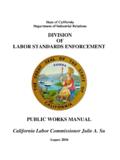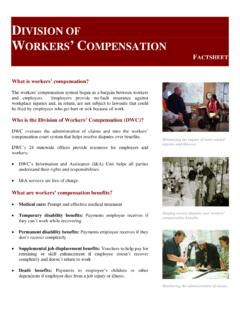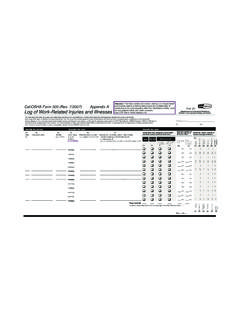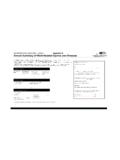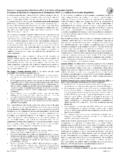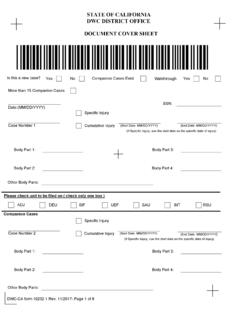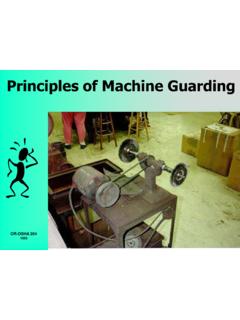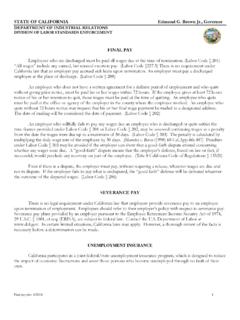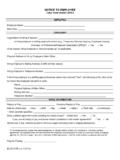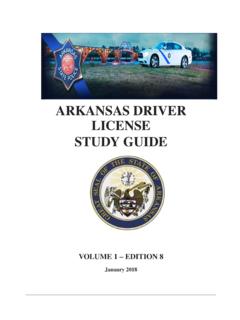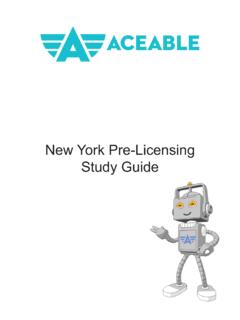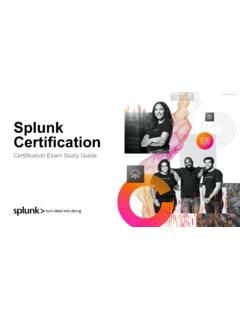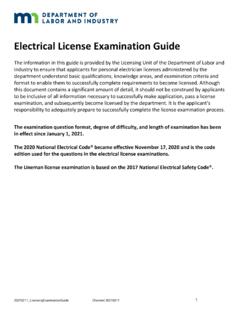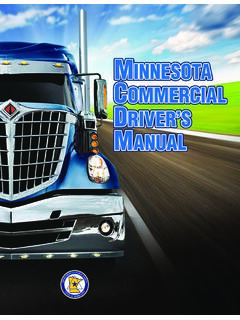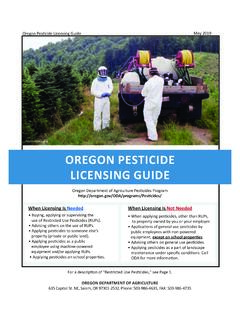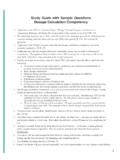Transcription of Farm Labor Contractor License Examination Study Guide ...
1 Farm Labor Contractor License Examination Study Guide NOTE: This Guide is designed to help you with the exam and to give you a basic idea of what the requirements are for farm Labor contractors. IT DOES NOT CONTAIN. EVERY APPLICABLE LAW. Table of Contents I. Basic Responsibilities A. The Examination .. 3. B. The License .. 3. C. Training supervisors .. 3. D. Recruiting workers .. 3. E. Contracting with growers .. 4. F. Grounds for losing your FLC License .. 4. G. Grounds for losing your FLC federal registration certificate .. 4. II. Health and Safety A. Handwashing and toilet facilities .. 5. B. Field safety .. 5. C. Heat illness prevention .. 6. D. Injury and Illness Prevention Program .. 6. E. Required postings .. 7. F. Reporting injuries and deaths .. 7. G. Penalties .. 7. H. Pesticide safety .. 7. III. Wages A. Minimum wage and overtime .. 11. B. Wage deductions .. 11. C. Meal and rest periods .. 11. FLC License Exam Study Guide (Rev. 01/2020) 1. D. 11.
2 E. Recordkeeping requirements .. 12. F. Posting 13. G. Final 13. H. Other .. 13. IV. Workers' Compensation and State Disability Insurance .. 15. V. Child Labor A. Permit to work and permit to 16. B. Work hours .. 16. C. Hazardous 16. VI. Employee Housing A. Permits .. 17. B. Postings .. 17. C. Workers' rights .. 17. VII. Transportation A. Required License and certificates .. 18. B. Vehicle insurance requirements .. 18. C. Driving restrictions .. 18. D. Vehicle restrictions .. 19. VIII. Treatment of Workers .. 20. FLC License Exam Study Guide (Rev. 01/2020) 2. Chapter I. Basic Responsibilities A. The Examination Farm Labor contractors (FLC) are required to take California's farm Labor Contractor exam every two years. An FLC who has violated any law related to farm Labor contracting must take the exam the year after the violation or at the request of the Labor Commissioner. B. The License To contract for farm Labor , you must: Have and show a valid and current California farm Labor Contractor 's License .
3 Have and show a valid and current FLC federal registration certificate from the Department of Labor . Be registered with the Agricultural Commissioner in each county where you supply Labor . Have a bond for the appropriate amount posted with the Labor Commissioner. Have workers' compensation insurance Disclose all people who have a financial interest in your contracting business. Every year, enroll and participate in at least nine hours of an approved FLC class, of which one hour should cover sexual harassment prevention. Notify the Department of Labor Standards and Enforcement (DLSE) immediately of any changes related to the business officers, address, legal entity, partnerships, etc. You must not: Sell or transfer any part of the profits of your business unless the Labor Commissioner gives written consent. Transfer your FLC federal registration certificate to anyone else. C. Training supervisors You must provide every crew leader, foreperson, or other person who supervises, directs, or controls any agricultural laborer on your behalf with information and training on the law governing worker health and safety, pesticide safety, the terms and conditions of employment, and at least two hours of training each calendar year in the prevention of sexual harassment in the workplace.
4 Additionally, federal law requires that all your field supervisors who recruit, solicit, hire, employ, furnish, or transport migrant or seasonal agricultural workers be registered as Farm Labor Contractor Employees (FLCE) and that they be trained in pesticide safety. You are responsible for any violations of federal law committed by any FLCE who works for you. D. Recruiting workers You, or any person working for you, must not make any false or misleading statements about the terms, conditions, or existence of employment. For example, you must not transport workers to a jobsite unless you already have an agreement to supply Labor there. If you drive workers to a jobsite and there is no work, you must pay them the agreed- upon rate of pay for all the time traveling to the jobsite and back. If there is a strike or lockout at the worksite, you must tell your workers about it before you take them there. If your employees or the grower request it, you must provide a written statement (in English and in Spanish) showing the amount of the contract fee you are receiving from the grower and the workers' rates of pay.
5 FLC License Exam Study Guide (Rev. 01/2020) 3. You may not charge a worker any kind of registration fee or employment fee or tell workers that they must pay a transportation fee to get a job. You must post your name, FLC License number, and the pay rate for workers at the entrance to your vehicles. Federal law also requires you to post a notice of the workers' federal rights. You must not contribute to or interfere with workers who are organizing a union. Before you hire workers, you must tell them (1) where they will be employed, (2) the pay rates, (3) the crops they will work on, (4) their work duties, (5) the expected length of employment, (6) whether you will receive a commission for sales from a store owned by the grower and about fees for (7) transportation, (8) housing, and (9) other benefits. Workers must not be required to purchase goods or services solely from a Contractor or a grower or any person acting for them. E. Contracting with growers Before you may contract to supply Labor for a grower, you must show the grower your California FLC License and your FLC federal registration certificate.
6 You must (on a form supplied by the Labor Commissioner) provide the grower with a payroll list of all employees who will be doing work for that grower. You must not split any fees with the grower or with any of his/her employees. F. Grounds for losing your FLC License Your License may be revoked if you do any of the following: Violate any state or federal law governing farm Labor contractors, including health and safety, payment of wages, or lack of workers' compensation insurance. Include any false information on your application. Change any condition under which the License was issued. Allow any employee to drive a farm Labor vehicle without proper License and certification. Fail to pay wages promptly Fail to comply with an FLC contract Sell alcoholic beverages as part of the FLC business . G. Grounds for losing your FLC federal registration certificate Similarly, your FLC federal registration certificate will be revoked if you: Do any of the above, or if you: Apply for the FLC License on behalf of someone else Violate any federal law relating to farm Labor contractors or fail to obey any court judgment by the Secretary of Labor Were convicted in the past five years of a felony or of violating any law related to gambling or alcohol in connection with farm Labor contracting Hire any person who is in this country illegally FLC License Exam Study Guide (Rev.)
7 01/2020) 4. Chapter II. Health and Safety A. Handwashing and toilet facilities If you employ fewer than five workers, it is acceptable to have one coed toilet if it can be locked from the inside. If you have 5 to 20 male and 5 to 20 female employees, you must have one toilet facility for men and one for women. If you have 21 to 40 male and 21 to 40 female employees, you must have two toilet facilities for men and two for women. If you have 41 to 60 male and 41 to 60 female employees, you must have three toilet facilities for men and three for women. For each additional either 20 male or 20 female employees or fraction thereof, you must increase your toilet facilities by one. One handwashing facility shall be provided for each 20 employees or fraction thereof. Handwashing and toilet facilities must be in the field if you employ five or more workers for two or more hours in hand Labor ; otherwise, if you employ less than five workers, you must supply transportation to and from offsite handwashing and toilet facilities.
8 The handwashing facility must get fresh air, and the water tank must hold at least 15 gallons. The water must be potable and refilled as necessary. You must post signs that say the water is only for handwashing. The facility must be stocked with soap and single-use towels and kept clean. Water may drain from the handwashing facility ONLY if it does not cause a problem or contamination. All toilet facilities must be screened to keep out flies and vermin. They must get fresh air and be private with doors that lock from the inside. Chemical toilet wastewater must drain into a >40-gallon tank designed to prevent contamination. Chemical toilet tanks must be drained into a sewer or approved septic tank. When pit toilets are filled to within 2 feet of the surface, cover them with 2 feet of compact dirt. The facilities must be in working order, clean, and stocked with odor control chemicals and toilet paper at all times. You must keep written records of maintenance of the facilities for two years.
9 The handwashing and toilet facilities must be close together and located within a quarter-mile or a five-minute walk from the worksite, whichever is shorter. If the terrain makes this too difficult, the facility must be as close to the workers as a vehicle can bring it. You must tell the employees where the facilities are located and allow all employees to use the facilities throughout the workday. In addition, you must tell your employees to use the facilities, drink water often, urinate often, and wash their hands before and after using the toilet and before eating or smoking. B. Field safety 1. First aid in the field There must be first-aid kits at the farm headquarters and in the transportation buses. At remote locations, you must arrange in advance for prompt medical care in case of serious injuries. You may need onsite facilities or equipment for transporting the injured person to a doctor or a way to call a doctor to the field. In addition, when they are out in the field, at least 1 employee in every 20 must have training in emergency first aid.
10 It is YOUR RESPONSIBILITY to arrange for emergency medical service in the field! 2. Tools A worker must not use any pole that can conduct electricity for fruit picking, nut knocking, etc. Conductive tools (metal ladders, irrigation pipe, etc.) should not be used where there is a possibility of exposure to high-voltage lines until the employees have been trained about such hazards. Supervisors must inspect the work area in orchards and other planted areas to determine the potential for exposure to high-voltage lines and caution employees about the hazard. FLC License Exam Study Guide (Rev. 01/2020) 5. Tools with short handles must not be used in a stooped, kneeling, or squatting position when the worker is weeding, thinning, or hot-capping. Long-handled tools must not be used as short-handled tools. Vegetable-trimming saws must have the unused portion of the blade covered. Where ladders are used in agricultural work, they should be kept in good condition. Ladders should be placed where there is a secure footing.
